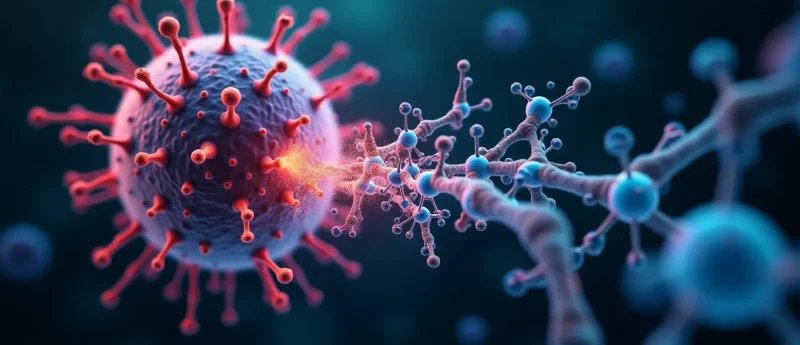LinkedIn Cofounder Launches Manas AI to Tackle Drug Discovery in Oncology

LinkedIn cofounder Reid Hoffman has teamed up with renowned oncologist Dr. Siddhartha Mukherjee to launch Manas AI, an AI system designed to accelerate cancer drug discovery. The company has secured over $24 million in funding to develop the tool, aimed at accelerating the development process and reducing costs for cancer therapeutics.
Why is Manas AI Needed?
Current drug discovery faces several key challenges, including high costs and lengthy timelines which often involve years of research, testing, and clinical trials. Additionally, the process can be inefficient, with many drug candidates failing in later stages due to unforeseen side effects or lack of efficacy.
Thus, the need for innovative actions to address these challenges is critical to ensuring more efficient and effective drug discovery.
This is where Manas AI can prove useful.
As LinkedIn and Manas AI’s Cofounder Reid Hoffman says, “Manas AI is breaking down barriers that have slowed medical innovation for decades, which will lead to exponential positive impact in our ability to treat human disease.”
The company has also partnered with Microsoft, and will be leveraging its Azure’s cloud computing platform and its extensive expertise in AI to create innovative cancer therapeutics.
“It’s especially exciting to integrate world-class AI capabilities with groundbreaking chemistry, biology, and wet-lab expertise as we aim to re-shape the future of medicine. Microsoft is proud to partner with Manas to help realize this critically important mission.”
Peter Lee, Corporate Vice President, Research and Incubations at Microsoft
Additionally, according to cofounder Dr. Siddhartha Mukherjee, the purpose of Manas AI is simple: “To transform how we discover and develop life-saving medicines. Through the power of AI and our world-class team, we believe we can drastically reduce the time and cost it takes to bring game-changing new treatments to patients. I am particularly excited about the novel models for generative chemistry that Manas is developing.”
How does Manas AI Work?
Manas AI is a start-up that focuses on finding treatments for different types of aggressive cancers including triple-negative breast cancer, prostate cancer, and lymphoma.
Its approach involves creating collections of different chemical compounds (called chemical libraries) and using AI to quickly analyze them and find the most promising therapeutic candidates.
To achieve this, Manas AI will run molecular docking — the prediction of the binding between two or more molecules, which results are generally evaluated based on the binding affinity and stability of a ligand to receptor.
What makes the tool stand out is that, through the Microsoft collaboration, it will do this about 100 times quicker than traditional methods. This speed will assist in digging deeper into how drugs bind to target molecules.
In other words, Manas AI will use AI to accelerate and make more affordable the process of discovering drugs to treat cancer by quickly identifying the best therapeutic candidates and understanding their interactions.
The raised capital will be utilized to expand the platform, advance its portfolio of drug candidates, and broaden its global clinical initiatives to reduce drug discovery timelines.
“Manas AI has the potential to compress the timeline to discovery of effective drug candidates while increasing the likelihood of success in clinical trials. This is a unique opportunity to dramatically change the drug discovery landscape and make a positive impact on billions of people around the world.”
Ken Frazier, Chairman of Health Assurance Initiatives at General Catalyst
What Comes Next
Hoffman and Mukherjee foresee a future where technologies such as Manas AI’s do not replace researchers but enhance and support their work.
While Hoffman believes that “AI will have a lasting and positive impact on humanity”, Mukherjee states that “If these generative models work, we aspire to replace conventional experimental methods to create medicines.”
However, despite AI’s potential, there are significant risks that must not be underestimated as these technologies continue to develop. One of them is the presence of bias in data used to train AI tools. For instance, research suggests that health services that rely on AI can contain inherent biases related to race and other factors.
Another challenge might be AI misinterpretation and inaccuracy in drug prediction. A notable example of this is the case of IBM Watson, an AI platform created by the International Business Machines Corporation (IBM, U.S.). In 2018, a report revealed that its supercomputer for oncology made incorrect cancer treatment recommendations.
Finally, AI-based drug discovery tools must meet appropriate regulation standards. However, there is uncertainty around how these systems are evaluated by regulatory bodies, especially in terms of data privacy. In 2017, it was revealed that Google’s DeepMind had accessed the health data of over 1.6 million patients at the Royal Free London NHS Foundation Trust without proper patient consent. This raised significant privacy and ethical concerns regarding the use of AI in healthcare, which are still ongoing.
Thus, before AI can be used reliably for drug discovery, it is crucial to address these critical challenges. Only with these safeguards in place can AI truly fulfil its potential to enhance and support the work of researchers in developing new, effective medicines.